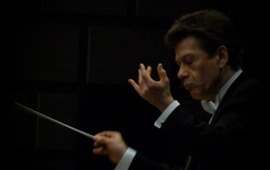> [Archived] Interviews

An Interview with the Musician Cristian Badea
The first edition of the International Music Festival will take place in Sibiu, during 24th -31st May, 2014. This event is organized by the Romanian Federation for Excellence in Music, whose president and founder is the conductor Cristian Badea. Among the guests: the members of the Borodin Quartet, the violinist Giuliano Carmignola, the flutist Mario Caroli, the horn player Tamas Varga, together with the youngest Romanian musicians. The concerts and recitals which comprise the programme will take place in the 'Sf. Treime' Romano-Catholic Church, the Concert Hall of the ASTRA Library and the 'St. Ioan'Evangelical Church.
Mr. Cristian Badea, welcome to our studio, this time not as conductor, as we know you, but as the initiator of an extraordinary foundation, with amazing projects.
I am the president of the Romanian Foundation for Excellence in Music - to give you the complete name - which I set up together with other important founding members two and a half years ago. The reason why I set it up is that I was trying to create a structure to facilitate a framework where the young generation of Romanian musicians would receive help. What does this help consist of? Of course, nowadays there are a lot of scholarships, all kinds of classes; people go abroad for master programmes. And here is where the problem lies. Going abroad is very good and it is very important because they need experience, they need to see other worlds, to work with many people; however, I honestly tell you that the best young people often go to study abroad with the idea of not returning. With the help of this foundation I am trying to create experiences, projects; these projects are meant as examples. First of all, I am attempting to create working weeks which usually end with concerts, where these young people - selected through national auditions - have the opportunity to work with the most important artists of the world; shoulder to shoulder, together. We are not talking here about master classes or lessons, although these also exist. We are talking about playing together, working together, and I think this is the best way for development, the best school. Of course, they need to be talented and to have a certain level of training and a certain personality, because the psychological pressure when working with a first-rank artist at international level is rather high for a young musician. I put them on the same team with the artists that you can usually see at the Enescu Festival. But this time, foreign artists are at the service of young Romanians. And this week represents a rather unique experience, since within the master programmes abroad they do not get the chance to work so closely with the principal musicians of the London Symphony, the Berlin Philharmonic, Swiss Romande, etc.
You create a very interesting and high-level dialogue. But one of the projects of your foundation is also the festival beginning this week, an event which brings forward interesting artistic benchmarks. Which are those?
The International Music Festival in Sibiu, launched last year with a concert at the 'Sf. Treime' Romano-Catholic Church, is a perfect example of this cultural model I presented earlier: we have an orchestra of young people selected mostly from Romania, but also from other countries, Romanians from abroad; this is very important: to bring back those who are deeply connected to this country, who left and built their careers abroad, but who are happy and enthusiastic about returning here, when invited. That is all I need to do: I invite them and they immediately accept the invitation. There are also first-rank artists who come to Romania, to Sibiu, for the first time. For example, the Borodin Quartet will give two concerts, including the famous Quartet No. 8 by Shostakovich; they will also give a master class to our young musicians. They will play together; master class means that they will play together. So, performing together with the Borodin Quartet is an amazing experience. There is also Mario Caroli, a wonderful flutist, who will give a master class, too. For Giuliano Carmignola this is a repeated experience, since he was with us last year. There will be other artists as well: Martin Owen, who was Principal Horn at the Berlin Philharmonic, and is now in London and the United States, will return to play beside our young horn musicians and will give a concert of chamber music. Vlad Maistorovici, an exceptional young composer and violinist, is the guest-composer of the festival. We will perform many of his works and I would like this idea to be continued. We want to support Romanian composers. This is a festival where the focus will be on the young, but, at the same time, there will be established artists, who are glad to come here. I can tell you that I talked to many people who told me they wanted to come, but my invitation arrived too late. Many said they would be glad to come to the next editions. I hope it will be a great festival and, more than that, I hope that people will participate, come to all the concerts.
Translated by Mihaela Olinescu and Elena Daniela Radu
MTTLC, The University of Bucharest














